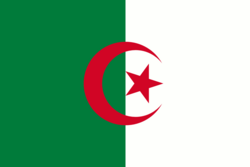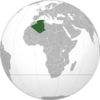Algeria Energy Situation
Overview
| People's Democratic Republic of Algeria | |||
| |
| ||
|
Capital |
Algiers (36°42′N 3°13′E) | ||
|
Official language(s) |
Arabic | ||
|
Government |
Semi-presidential republic | ||
|
President |
Abdelaziz Bouteflika | ||
|
Prime Minister |
Ahmed Ouyahia | ||
|
Total area |
2,381,741 km2 | ||
|
Population |
35,423,000 (2010 estimate) | ||
|
GDP (nominal) |
$158.969 billion | ||
|
GDP Per capita |
$4,478 | ||
|
Currency |
Algerian dinar (DZD) | ||
|
Time zone |
CET (UTC+01) | ||
|
Calling code |
+213 | ||
Minerals that can be found in this region are amongst others oil, gas, iron, and lead.[4] Together with agricultural goods, they make up the majority of export goods. Furthermore, they are the reason, why Algeria is part in international economic conglomerates, such as the OPEC or the OAPIC. Algeria’s gross domestic product (GDP) has been constantly rising in the last couple of years, bringing it to the approximate amount of $160 billion in 2010. The GDP per capita is hence about $7.3.[5]
Algeria has a number of transnational issues to deal with, including an international dispute with the Moroccan administration of Western Sahara and illegal schemes in form of smuggling, human trafficking and forced labor.[6]
Energy situation
Type your text here
Energy Supply
Type your text here
Electricity
Type your text here
Energy Consumption
Type your text here
Energy demand
Type your text here
Electricity
Type your text here
Access rate
Type your text here
Market situation for different energy technologies and services
Solar Energy
Type your text here
Wind Energy
Type your text here
Biomass
Type your text here
Biogas
Type your text here
Hydro Power
Type your text here
Other renewable Sources
Type your text here
Key problems of the energy sector
Type your text here
Policy framework, laws and regulations
Type your text here
General Energy policy, Energy strategy
Type your text here
Important Laws and regulations
Type your text here
Specific strategies (Biomass, renewable energies, rural electrification, energy access strategy etc.)
Type your text here
Institutional set up in the energy sector
Type your text here
Governmental institutions Private sector (enterprises, NGOs)
Type your text here
Activities of other donors, activities of NGOs
Type your text here
Existing projects
Type your text here
Further Reading
Type your text here
External links
- ↑ 1.0 1.1 1.2 1.3 1.4 Auswärtiges Amt (German Ministry of Foreign Affairs), Last Updated: October, 2010, Access: September 16, 2011, URL: http://www.auswaertiges-amt.de/DE/Aussenpolitik/Laender/Laenderinfos/01-Nodes_Uebersichtsseiten/Algerien_node.html Cite error: Invalid
<ref>tag; name "null" defined multiple times with different content Cite error: Invalid<ref>tag; name "null" defined multiple times with different content Cite error: Invalid<ref>tag; name "null" defined multiple times with different content Cite error: Invalid<ref>tag; name "null" defined multiple times with different content - ↑ ibid. CIA World Factbook
- ↑ Auswärtiges Amt (German Ministry of Foreign Affairs), Last Updated: October, 2010, Access: September 16, 2011, URL: http://www.auswaertiges-amt.de/DE/Aussenpolitik/Laender/Laenderinfos/01-Nodes_Uebersichtsseiten/Algerien_node.html
- ↑ Deutsche Außenhandelskammer (German Chamber of Foreign Trade - AHK), Last Updated: 2011, Access: September 16, 2011, URL: http://algerien.ahk.de/algerien/
- ↑ Central Intelligence Agency (CIA) - World Factbook, Last Updated: August 23, 2011, Accessed: September 16, 2011, URL: https://www.cia.gov/library/publications/the-world-factbook/geos/ag.html
- ↑ Central Intelligence Agency (CIA) - World Factbook, Last Updated: August 23, 2011, Accessed: September 16, 2011, URL: https://www.cia.gov/library/publications/the-world-factbook/geos/ag.html





















